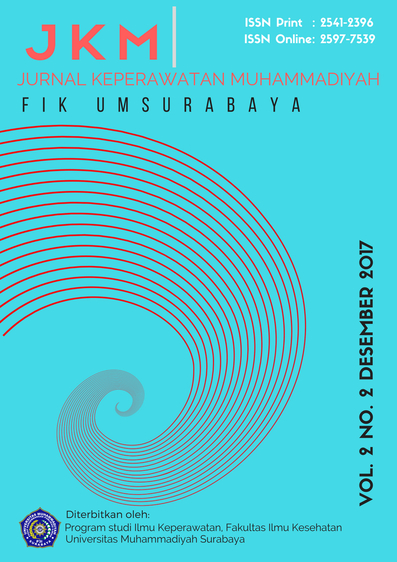Hubungan Prestasi Akademik Dan Faktor Eksternal Dengan Kelulusan Uji Kompetensi Mahasiswa Keperawatan Stikes Jenderal Achmad Yani Yogyakarta
DOI:
https://doi.org/10.30651/jkm.v2i2.985Abstract
Objective: to know the relationship of academic achievement and external factors with the graduation of competency test of nursing students Stikes General Achmad Yani Yogyakarta
Methods: this research is an associative descriptive research. This research was conducted at Stikes General Achmad Yani Yogyakarta. The data used use cross sectional approach, in the absence of any intervention and data retrieval is done one time.
Result: result of correlation test between academic achievement level of bachelor degree of nursing with competence test obtained p-value 0,002. The result can be interpreted as having relationship because p-value is less than alpha (0,05). The value of close relationship in the range of categories is very strong that is 0.836. The result of correlation test between the achievement index of professional ners with competency test obtained p-value 0.106. The result can be interpreted as no relationship because p-value is more than alpha (0,05). The result of comparation test between academic factor and competence test is obtained p-value 0,001. The result can be interpreted as having relationship because p-value is less than alpha (0,05). The value (r) or the closeness of the relationship of these two variables is very strong at 1.00. Result of comparation test between environmental factor with competence test got result p-value 0,807. The result can be interpreted as no relationship because p-value is more than alpha (0,05).
Conclusion: There is a relationship between IPK S1 Nursing with graduation of nurses competence test. There is no correlation between IPK Ners with the graduation of nurse competency test. There is a correlation between academic factor with passing of nurse competence test. There is no correlation between environmental factors with the passing of nurse competence test.
References
Abdillah, A. (2016). Faktor-faktor Yang mempengaruhi kelulusan uji kompetensi ners Indonesia. JPAP. Vol 2 No 2. 373-380
Badan Pengembangan dan Pemberdayaan Sumber daya Manusia Kesehatan, (2013). Uji Kompetensi Bidan dan Perawat. http://bppsdmk.kemkes.go.id/puskatmutu/index.php/pustanserdik/kontenberita/94
Daryanto. (2010). Media pembelajaran. Yogyakarta: Gava media.
Djamarah, S.B. (2011). Psikologi Belajar. Edisi revisi . Jakarta: Rineka Cipta
Friedman, Marilyn M. (2010). Buku ajar keperawatan keluarga: Riset, Teori dan Praktek. Jakarta : EGC
Ilyas . (2008). Fungsi dan pengukuran prestasi belajar.
Pustaka belajar. Yogyakarta.
Iskandar, (2016). Faktor-faktor yang memengaruhi keberhasilan belajar mahasiswa pada model pembelajaran student centered learning di Stikes Jenderal Achmad Yani Yogyakarta.
Kaplan & Sadock buku ajar psikiatri klinis. Ed Ke-2. EGC : Jakarta. Hal 230-233
Notokusumo, R. (1989). Strategi Belajar Mengajar. Jakarta. Bina Aksara
Nursalam. (2012). Manajermen Keperawatan: Aplikasi dalam Praktik Keperawatan Profesional. Jakarta: Salemba Medika
Permendikbud, (2014). Standar nasional pendidikan tinggi. No 49. Jakarta
Sadock , Benjamin James dan Sadock, Virginia Alcott. 2010. Gangguan Ansietas.
Sisdiknas, (2003). Sistim pemdidikan nasional, No 20. Jakarta
Slameto. (2010). Belajar dan Faktor-faktor yang Mempengaruhinya. Jakarta: Rineka Cipta
Sugiyono, (2007). Statistika Untuk Penelitian.Bandung: Alfabeta
Syah M,. (2006). Psikologi belajar, Jakarta: PT. Raja grapindo persada
UU Keperawatan (2014). Praktik Keperawatan. Nomor 38. Jakarta
Downloads
Published
Issue
Section
License
- Penulis tetap memegang hak atas karyanya dan memberikan hak publikasi pertama kepada jurnal ini yang secara simultan karya tersebut dilisensikan di bawah:Â Creative Commons Attribution-ShareAlike 4.0 International (CC BY-SA 4.0)









